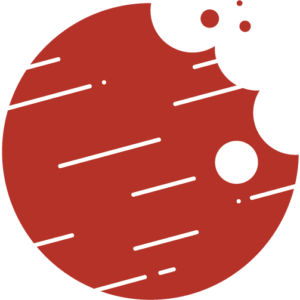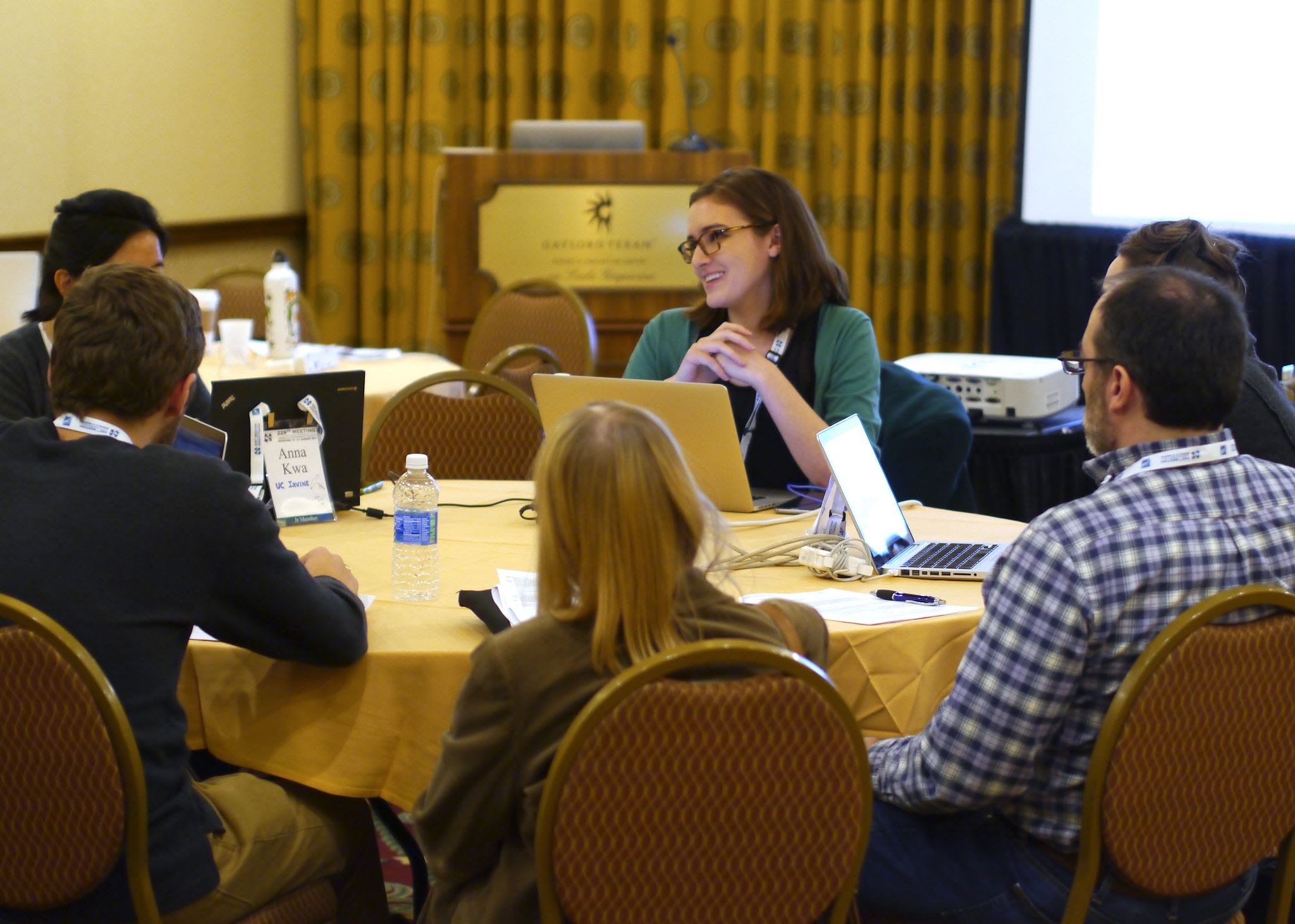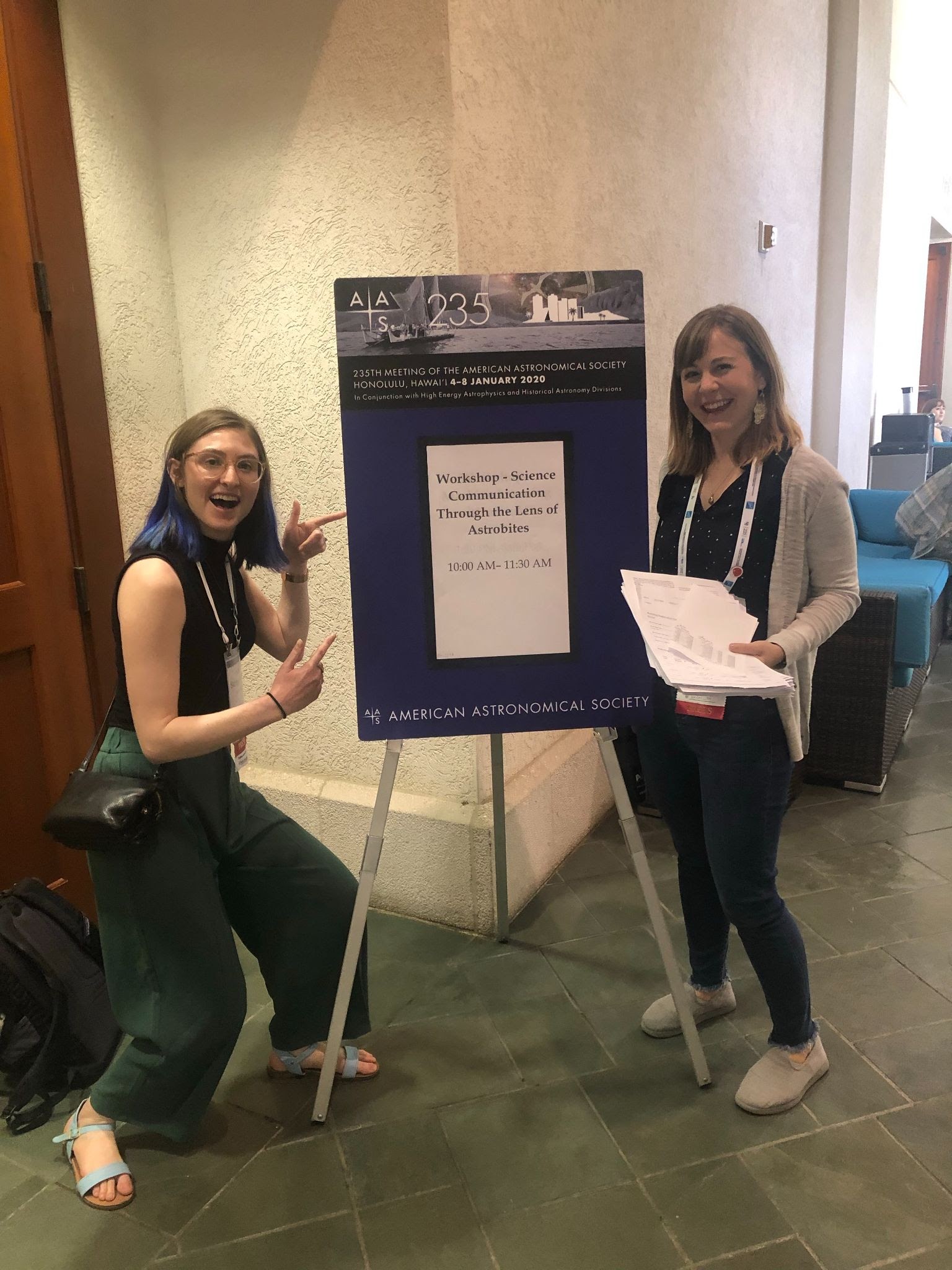Astrobites: Making Research Accessible Through Bite-Sized Summaries
Briley Lewis (UCLA) and the Astrobites Collaboration
 Let’s be honest, reading scientific papers is difficult. It’s a challenging skill to acquire, and often inaccessible to early career researchers. So, how are beginning students supposed to even start navigating current research?
Let’s be honest, reading scientific papers is difficult. It’s a challenging skill to acquire, and often inaccessible to early career researchers. So, how are beginning students supposed to even start navigating current research?
Astrobites, founded in 2010 by a group of graduate students, aims to address that question. Our goal is to present (at least) “one interesting paper per day in a brief format that is accessible to undergraduate students in the physical sciences”. Each day of the week, Astrobites posts a new summary of current astronomy research on our website, written by graduate students across the globe. Our website also features “Beyond” posts, tackling topics related to career navigation, climate change, equity and inclusion, and more, and we regularly cover scientific conferences and events, including live blogging of the biyearly AAS meetings. Astrobites has even led to many sister sites for research in a variety of fields — from quantum mechanics to marine science — and in multiple languages, now all part of the Science Bites family.
Although originally intended as an online resource for undergraduates, Astrobites has become a tool for astronomers and students of all levels. Instructors have brought Astrobites into their classrooms, using the summaries to introduce students to research and break down complex astronomy concepts. In 2012, we published our first education research paper in Astronomy Education Review — led by former Astrobites authors Nathan Sanders, Susanna Kohler, and Elisabeth Newton — on the uses of Astrobites in undergraduate science courses in the site’s first few years of existence.
A follow-up article, published in the American Journal of Physics, harnessed the experiences of educators to create a more comprehensive set of recommendations for using Astrobites in the classroom, including three full lesson plans. Activities in these lessons included regular reading assignments from Astrobites, a student literature review using Astrobites, and a writing assignment where students compose their own Astrobites-like article. Lessons included learning objectives such as building reading comprehension to make connections to curriculum, developing familiarity with the literature, and practicing how to convey ideas and knowledge to different audiences.
In order to share these tools and learn from educators in our scientific community, we have hosted three workshops at AAS meetings. Our first, at AAS 229 in 2017, provided an overview on how to use Astrobites in the classroom. Using techniques presented by Astrobites, participants developed lessons for their own classes. Participants were also given a full set of lesson plans produced by Astrobites, including instructions, class handouts, rubrics, and more. This workshop provided our education committee with valuable feedback from educators on how to improve our materials and services.

We have received the AAS Educational and Professional Development Grants (AAS-EPD) three times since the program’s inception to fund our education efforts. Thanks to these EPD grants, we were able to continue and expand our workshops at AAS meetings. Our 2018 workshop at AAS 231 — led by authors Benny Tsang, Nora Shipp, and Gourav Khullar — again introduced new educators to our resources for Astrobites in the classroom, which had been improved upon with feedback from other educators and the previous workshop’s participants. Collaboration with educators has continually informed our approach to creating educational resources with Astrobites, and has led to multiple undergraduate authors publishing guest posts on our sites through classroom partnerships.

At AAS 235 in 2020, we tried a new approach, not only using Astrobites to introduce research but to teach fundamental principles of science communication and writing. In this workshop, led by authors Caitlin Doughty, Stephanie Hamilton-Deppe, Kate Storey-Fisher, and Briley Lewis, participants learned about dealing with jargon in scientific writing and the importance of storytelling. They then wrote an introductory paragraph for an Astrobites-style post, engaging in peer editing and analysis of existing Astrobites to improve their writing.
Looking towards the future, we hope to continue our many partnerships with educators and develop more resources for using Astrobites to make research accessible to students, from high school through grad school. Ideally, we would like to create a platform for sharing resources, lesson plans, and other educational materials based on Astrobites. We also hope to conduct a third research study that investigates how effective our lesson plans are in preparing undergraduate students to engage with the research literature with a larger sample size of classrooms.
Our collaboration’s recent white paper for the Astro2020 Decadal Survey summarized Astrobites’ successes so far and included recommendations based on our work such as developing bites-based journal clubs, increasing support for graduate student education in science communication, and using resources like Astrobites in classes. Our mission of increasing access to scientific literature is key to mitigating gatekeeping of scientific knowledge, increasing diversity and equity in our field, and preparing upcoming generations of scientists.
If you are using Astrobites in your classroom or are interested in doing so, we’d love to hear from you!
Astrobites has been funded and supported by the American Astronomical Society, including AAS Education and Professional Development Grants.
Thank you to Kate Storey-Fisher, Ali Crisp, Gourav Khullar, Susanna Kohler, and Pratik Gandhi for your advice and edits on this blog post.
Additionally, a huge thank you to all the Astrobites members are/have been involved in our Education work: Nathan Sanders, Susanna Kohler, Elisabeth Newton, Chris Faesi, Ashley Villar, Michael Zevin, Benny Tseng, Tarini Konchady, Mike Foley, Amber Hornsby, Mia de los Reyes, Nora Elisa Chisari, Ashley Villar, Kaitlyn Shin, Caitlin Doughty, Nora Shipp, Joanna Ramasawmy, Zephyr Penoyre, Tim Lichtenberg, Oliver Hall, Kate Storey-Fisher, Briley Lewis, Aaron B. Pearlman, Alejandro Cárdenas-Avendaño, Joanna Bridge, Elena González-Egea, Vatsal Panwar, Mara Zimmerman, Gourav Khullar, Abby Waggoner, Alex Gough, Ali Crisp, Alice Curtin, Avery Schiff, Emma Foxell, Perry Hatchfield, Haley Wahl, Jamie Sullivan, Jason Hinkle, Jenny Calahan, Jessica Roberts, Katya Gozman, Lisa Drummond, Michael Hammer, Pratik Gandhi, Ryan Golant, Sabina Sagynbayeva, Sam Factor, Sumeet Kulkarni, and Tomer Yavetz.

